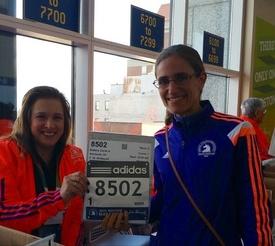Low carb/clean eating and half-marathon training?

Saree1902
Posts: 611 Member
Apologies if this has been asked before but I can't seem to find old posts.
Just wondering if anyone is managing mid-long runs on a low carb plan? I'm currently seeing a trainer who has put me on a very low carb plan (small portion of rice/sweet potato/quinoa with evening meal only). It's not an issue at the moment since I'm sticking to 2-3mile runs and the exercises she sets me.
However, I am wondering if I'll be able to sustain longer runs come January when I start preparing for an April half marathon...does anyone else have experience with this?
On a related note, I have also kicked sugar and most processed food with this diet (other than my beloved dark chocolate and a weekly cheat meal) and I tend to be heavily dependant on sports drinks for runs longer than 8 miles. Does anyone train without sugary drinks? can you fuel mid-run with something else, or is it a matter of better eating before heading out?
Many thanks in advance,
Sarah
Just wondering if anyone is managing mid-long runs on a low carb plan? I'm currently seeing a trainer who has put me on a very low carb plan (small portion of rice/sweet potato/quinoa with evening meal only). It's not an issue at the moment since I'm sticking to 2-3mile runs and the exercises she sets me.
However, I am wondering if I'll be able to sustain longer runs come January when I start preparing for an April half marathon...does anyone else have experience with this?
On a related note, I have also kicked sugar and most processed food with this diet (other than my beloved dark chocolate and a weekly cheat meal) and I tend to be heavily dependant on sports drinks for runs longer than 8 miles. Does anyone train without sugary drinks? can you fuel mid-run with something else, or is it a matter of better eating before heading out?
Many thanks in advance,
Sarah
0
Replies
-
I typically do not do anything special for fuel for runs under 15 miles, including hydration (unless it's very hot out). By virtue of being gluten free, my diet typically tends to be lower in carbs than most runners and it has not been a problem. I am currently in marathon training, so I have made an effort to increase my carbs over the last few months to sustain my higher mileage though. But when I was running 25-30 miles per week, I generally ate way less than 200g of carbs a day. I rarely drink sports drinks. Pre-run snack is usually a banana.
Have you talked to your trainer about this? I think that would be the best place to start.0 -
I'd be asking the trainer why low carb especially when you're planning a lot of cardio. You don't need to cut out whole food groups to lose weight and unless you intend eating ultra low carb as a way of life then why do it now. Just seems counter intuitive to me. I'm naturally suspicious as most trainers I've met had no qualifications in nutrition, they've just done a module in training and mixed in bro-science.
I'll carry a gel or 2 when running 13miles+ but rarely use them - I see how I feel around 9 miles. Same with water, I used to carry it and then get home having lugged a bottle around and only had a mouthful so stopped bothering.0 -
I typically do not eat much white rice, bread, pasta etc or processed foods. However, that doesn't mean I am eating low carb. Fruits and vegetables are full of carbohydrates and if you are wanting to be a distance runner this is what you need.
You do not need to fuel for runs up to a half marathon distance. I use gatorade only during marathons, for the race and maybe one or two of the 20 mile training runs just to make sure my stomach is ok with it. You don't even really need water for distances up to half. I would ditch the sugary drinks all together and start reading up on fasted running. I do not have anything other than a cup of coffee before my long runs (up to 21 miles) and take nothing mid run. It just isn't necessary.0 -
I definitely feel carbs have their place when you look to perform in a 2+ hour race (and I do use carbs in practice in preparation for these kinds of races to experiment with tolerance levels) , but, other than those times, I don't see much benefit to it. That said, I will often bring an emergency gel when I am trying out a new route in case I get lost and need some fuel to get home.
Now...doing a whole training cycle low carb...just not for me.0 -
Why is a trainer putting you on a diet plan???0
-
Thanks everyone - I spoke to the trainer today and she did say that once I start ramping the miles up in the new year, more carbs would be added. I'm trying to lose weight at the moment so the diet is focussed on that.
However, I am feeling a lot better for ditching sugar in particular, hence wanting to find new strategies for distance running (which used to involve breakfast biscuits, lucozade sport and jelly babies!)
Thanks for the tip on fasted running - I do tend to run up to 6 miles fasted, but have yet to try longer distances.0 -
May I suggest you read some of the recent books by Matt Fitzgerald. IMO he suggests some reasonable strategies (and reasons) for the way your fuel plan should look for improved performance. Generally speaking, anything less than 10 miles doesn't get supplemental fuel unless I want to try out something "new" and then it has to be more than 8 miles before I do that.
Fitzgerald suggests that constantly relying upon refueling during training can end up being a crutch of sorts.
BTW, a low carb diet plan means that you have a higher relative value of fat and protein...unless you are consuming large quantities of non-digestible fiber for bulk.0 -
SonicDeathMonkey80 wrote: »Why is a trainer putting you on a diet plan???
I'm seconding this. Trainers don't have training in nutrition. If you want advice on your eating plan, seek out a registered dietitian.
0 -
If you want to loose weight, why don't you log your calories and use a small deficit? There's this great website call myfitnesspal that helps you do this.... wait.... You already know about this website.0
-
Yes, thanks I do...but simply cutting calories out of my previously dodgy diet did not work for me (that's just me....I appreciate it works fantastically for hundreds of other members) -I tended to get hungry and grouchy. Hence getting some help with the types of food I eat to lose weight without the dreaded hanger striking.
And so far so good - I'm enjoying the diet and the results I'm getting but as mentioned in my original post, I'm starting to think ahead to my 2015 races and was wondering if anyone has done managed a similar diet combined with half marathon training.
And in answer to the nutrition questions, she does have a post-grad qualification so I'm happy with her knowledge there.
Will give that Matt Fitzgerald book a go - thanks very much.0 -
Yes, thanks I do...but simply cutting calories out of my previously dodgy diet did not work for me (that's just me....I appreciate it works fantastically for hundreds of other members) -I tended to get hungry and grouchy. Hence getting some help with the types of food I eat to lose weight without the dreaded hanger striking.
And so far so good - I'm enjoying the diet and the results I'm getting but as mentioned in my original post, I'm starting to think ahead to my 2015 races and was wondering if anyone has done managed a similar diet combined with half marathon training.
And in answer to the nutrition questions, she does have a post-grad qualification so I'm happy with her knowledge there.
Will give that Matt Fitzgerald book a go - thanks very much.
If you do want to follow Matt Fitzgerald's nutrition plan, you'll need to abandon the low carb diet completely and go high carb (really high carb if you are doing a lot of runs each week). I've never been able to get enough carbs when I tried following it. This was a couple of years ago though.
I might re-read his book again but I'm not too sure how well a very high carb plan will work for very long distance running and ultras. Some contradictions in his book about fats as fuel source.
Anyone has any thoughts on this?0 -
I've trained for a half marathon while trying to eat mainly low-carb (no processed carbs, added sugars, etc). It works out OK but you definitely feel lower energy. No way would I actually race low-carb - I added some carbs (eg whole wheat toast) back in my diet the week before. As for fueling during the run, personally I would eat something ahead of time that will last a long time.... peanut butter or something. And bring a bottle with a bit of sugarfree lemonade mix - it'll taste good even if it won't give you any actual energy!0
This discussion has been closed.









